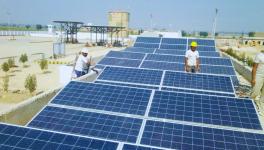Bengal: CM Mamata Banerjee Urged to Look South for Solution to Climate Change Impacts
West Bengal Chief Minister Mamata Banerjee. Image Courtesy: PTI
Kolkata: With the West Bengal government bearing severe impacts of climate change year after year, several state-based environmentalists have urged Chief Minister Mamata Banerjee to take key learnings and implement Tamil Nadu’s Climate Resilience model in the state.
Known to spearhead many path-breaking initiatives to build climate resilience, the Tamil Nadu government has set up a Special Purpose Vehicle -- the Tamil Nadu Green Climate Company (TNGCC) -- to carry out the Climate Action Plan effectively. To do this, the southern state has launched the Tamil Nadu Climate Change Mission.
Speaking to NewsClick, Sourav Chakraborty of Paschim Banga Vigyan Manch (PBVM) said the Environment Impact Assessment 2020 Act is being diluted, and no EIA is being done for newer projects. “In our state, rampant tree felling is taking place, and the role of the tribals in protecting forests is being looked down upon. Wetlands are being filled up in the state on a rampant basis. Sands and stone mining in river beds have taken an enormous toll, and as a result of that, flash floods are happening regularly,” he said, adding that, “if the experience of Tamil Nadu is emulated here, then it will be a positive effort on the ground, though much is to be done by the central government in this regard.”
The key goals of the Tamil Nadu Climate Change Mission are to formulate plans to reduce overall greenhouse gas emissions in Tamil Nadu, increase public transport use, develop strategies to reduce emissions through green energy and renewable energy, increase forest cover, manage waste effectively, and other ways to mitigate impacts of climate change.
Chakraborty said that the central government’s role regarding climate change mitigation is only on pen and paper. “In international conferences, they give commitments; however, there is no reflection of these commitments on the ground. Assurances like progressing towards zero-emission by circa 2070, or moving away from a 45% carbon economy are still not met. Another assurance was given that there will be 450 gigawatts of renewable energy by 2030; till now, there is only 100 gigawatts of renewable energy available in the country,” he said.
“On the other hand, the redistribution of the coal blocks in the country signals enhanced fossil fuel usage, and it is a dichotomy. The laws of the land to hold polluting agencies accountable have been diluted to a great extent, encouraging the wrongdoers,” Chakraborty said.
He also highlighted the failure of the Namami Gange project, as over 40 lakhs of cauliform bacteria per millimetre of water had been found in Dakhineswar. Even West Bengal Pollution Control Board says that 17 rivers of the state are grossly polluted and unfit for even bathing. “In Deucha Pachami (coal bloc) and Farakka, the ground is being prepared for corporate loot of natural resources by cutting trees,” he alleged.
Subhash Dutt, an environmental lawyer, stated that West Bengal has been blessed by the Sunderbans on one side and the Himalayan foothills on the other. But unfortunately, the impacts of climate change can be seen on both sides. “For a huge state like ours, whose people and their livelihood are extremely vulnerable to risks posed by climate change, exploring and setting up a unique mission to build climate resilience or take key learnings from a state like Tamil Nadu is ideal,” he said.
Dutt added that it is essential that the mission is under the leadership of the Chief Minister as that will ensure accountability and implementation on the ground.
With multiple national and international research papers stating that the next 10-15 years are crucial for ensuring mitigation, adaptation, and resilience, West Bengal has already seen notable examples of severe climate impacts. North Bengal, central regions, and the Sunderbans delta in the south are all at risk from various factors, including extreme heat stress, drought risk, sea level rise, and air pollution. According to the IPCC, cities in West Bengal, like Kolkata, are among the top ten cities for multi-risk hazards (cyclones, floods, droughts, and earthquakes).
Cyclone Amphan, the first super cyclone to form in the Bay of Bengal since 1999 and one of the most intense storms to hit West Bengal over the last century, may have had the most impact on India. Over 100 people died in the disaster, and it is estimated that 1,600 square kilometres of mangrove forests in the Sundarbans were destroyed. The mangroves in the delta lessened the effects of the cyclone. Amphan was also responsible for a sizable portion of Kolkata’s green cover being lost.
Nabo Dutta, a city-based environmentalist, noted the efforts being taken by Tamil Nadu and said that it is worth learning from examples and steps being taken by any state or country, which will benefit the people at large and also help protect the state and future generations. “Setting up such a mission or dedicated body to work on climate issues will yield results only when their suggestions and recommendations are implemented on the ground. There needs to be strong coordination with various districts, and hence its functioning will only be more impactful if there is direction from the Chief Minister directly,” he said.
According to the IPCC, Amphan-induced damage was assessed to be worth $13.5 billion and 2.4 million people were displaced in India alone in 2020, including 800,000 individuals who were evacuated in advance by the authorities.
According to scientists, one of the primary causes of this supercyclone was the warming of the seas due to climate change.
Anjal Prakash, Research Director and Adjunct Associate Professor at the Indian School of Business and Lead IPCC author, told NewsClick that West Bengal is unique because of Sunderbans, which is extremely sensitive to climate change. "One has seen in the recent past how it (Sunderbans) has been impacted along with the mangrove forest, which is the first line of defence for the state against any changes in the environment, especially against frequent cyclones," he said.
“There is an urgent need to protect the state and its citizens against the recent rise in extreme weather events, particularly cyclones, which have severely impacted their livelihood in recent years. Apart from the Sundarbans, the north Bengal area, which is part of the Himalayan region, is also highly vulnerable to any changes in climate,” he said.
Prakash said that he would urge the political leadership of West Bengal to work towards a program, especially a cell, that could help integrate climate change and climate science into new understanding and knowledge by using information from key reports. “The learnings should be incorporated into development planning, and it can be done only through specific detailed planning as well as the support of experts,” he said.
Dr Manas Bhuiya, West Bengal minister for environment and forest, refused to tell NewsClick about any future plans towards this direction. However, it has been learnt that the state is seriously thinking about setting up a committee to oversee climate change issues. Now, the question is that without being an empowered body, this committee might only remain on paper.
Dr Abhijit Chatterjee, Scientist and Associate Professor at the Bose Institute, said that Climate change is an issue that affects a diverse state like West Bengal in more than one way. "In the north, there is the Himalayas, and North Bengal has seen flash floods to extremely hot weather in the recent past. In the south, there is the Sundarbans which, too, has seen extreme sea level rise leading to the inundation of several islands. Under these circumstances, the constitution of any climate change company or corporation will be an essential step in the right direction, while keeping in mind the diversity of the state," Chatterjee said.
Get the latest reports & analysis with people's perspective on Protests, movements & deep analytical videos, discussions of the current affairs in your Telegram app. Subscribe to NewsClick's Telegram channel & get Real-Time updates on stories, as they get published on our website.
























